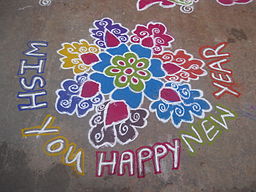Looking ahead: Reviewing a year of diversity at Backchannels in 2022
Joseph Satish VedanayagamJanuary 9, 2023 | Reflections

Happy New Year Rangoli at Nellore, India [Image Courtesy: YVSREDDY, CC BY-SA 3.0, via Wikimedia Commons]
While maintaining rigorous editorial standards, we have tried to widen the transnational character of 4S and Backchannels by publishing a higher number of posts in languages besides English. We do hope that this encouraging trend will continue in 2023 while also acknowledging the challenges in providing appropriate English translations. In 2022, we were happy to receive and publish more posts from the African subcontinent. And for the first time, we published a jointly authored blog post from Bangladesh and Afghanistan. Collaborating with authors from conflict ridden regions has also opened our eyes to the ethics of care, not only for the authors but also for our editor-colleagues.
We represent a diverse team from five continents and from more than half a dozen countries, with many of us being non-native speakers of English (both from the North and the South). The new editors who joined us in 2022 and the existing editors made special efforts to understand and engage with diverse perspectives while not speaking the same language (both literally and metaphorically). But it was this respect for difference that helped to establish Backchannels as a safe and welcome forum for sharing a diversity of debates and encounters with the global technoscientific order. Editors from the global North have in particular tried to maintain sensitivity while publishing issues of relevance to the global South. This collective ethos will continue to help us as we negotiate a new year of engaging with a fresh set of ideas and perspectives across the global STS spectrum.
As coordinator of the Backchannels editorial committee, I am happy to share that our collective effort has been hugely rewarding. We have received a higher number of voluntary submissions in 2022, a greater number of posts published in comparison to 2021, and also a greater number of pageviews and written feedback from readers. Below, we highlight some of the recurring themes that have been published in Backchannels in 2022 while providing examples of posts related to each theme.
Gender-related issues: Posts have highlighted a range of issues related to gender, employing feminist studies. These include an analysis of social media usage by women in Afghanistan, a multi-sited examination of the undermining of women’s abortion rights in USA, the need for emotional self-care while documenting gender related violence in the Americas, and historical studies of agency among women natural historians in colonial India.
Artificial intelligence and digitization: Several posts explored varied aspects related to artificial intelligence (AI), automation, and digital technologies. These including an account of AI-based horticulture in the Netherlands, issues related to privacy and democracy in AI-driven technologies in Germany, and the digitization of governance infrastructures in Congo.
STS genealogies and pedagogies: Authors explored various ways of using and teaching STS to teach students of biology in India, using serious games to understand knowledge production in Latin America, positioning STS viewpoints while engaging in molecular engineering research in Switzerland and the challenge of ensuring “just infrastructures” between people, data and algorithms in the US.
University-community collaborations: Authors have emphasized the role of listening to and working with the community for STS scholarship to drive meaningful social change. Posts discussed the emergence of self-governed producer-consumer supply chains in Latin America, a public humanities project documenting the nuclear discourse in USA, a global network analysing issues of labour and technology from an anti-racist, feminist, and transnational perspective, and a report of a community oriented “walkshop” guided by local elders in Australia.
National S&T policies: Some posts examined government policies from the viewpoint of STS. This included an analysis of e-governance platforms and smart city infrastructures in India, policies governing responsible innovation in China, the use of technology in border security and migration control in Turkey, the failure of state apparatus in providing water infrastructures in Colombia and how the politics of market speculation affects food production in Kenya.
Convergence of art, design and STS: Authors examined the synergies between the arts and STS in various forms and academic practices. This included an interview with the editors of a handbook on art and STS, and an account of a global Art-Tech-Nature-Culture community that draws upon creative practices across disciplines.
Climate and ecology: As in the previous years, several posts explored issues related to the environment and climate change. This included a study of peatland restoration projects in Indonesia, mapping conservation practices across different ecological sites, and a report of a seminar series with activists and researchers to understand systemic injustices in environmental protection in USA.
Besides the above broad themes, posts also included interviews with scholars and students, reviews of books and edited journal collections, reports of workshops and conferences, and descriptions of innovative, trans-disciplinary STS projects.
We hope that you enjoyed reading Backchannels in 2022 and look forward to receiving your views and submissions in 2023. For more information on how to contribute your submissions to us, please visit the Editorial Guidelines page. Have a splendid 2023!
Published: 01/09/2023
